
November 26, 2019
Dear friends of Berkeley Journalism,
Briefly overshadowed by the now seasonal reminder of environmental vulnerability, when power outages prompted by the threat of widened wildfires forced campus to close, the fall brought renewed evidence of accomplishment among the School’s students, teachers and alumni. Berkeley Journalism led a state-wide collaboration of 30 news outlets, held our first student-led jobs fair, medaled in the Student Academy Awards for the fifth straight year, and celebrated an alum’s winning the National Book Award for nonfiction for her first book.
Faculty news had highs and lows. We brought aboard four-time Pulitzer Prize-winner David Barstow of The New York Times as the new Reva and David Logan Distinguished Chair in Investigative Journalism and head of our esteemed Investigative Reporting Program, but we lost a deeply admired teacher, Continuing Lecturer Edwin Dobb, who died suddenly in July. (As a news item, I should also note my own announcement that I’m stepping aside as Dean this July after 7-1/2 years to return to teaching and writing.)
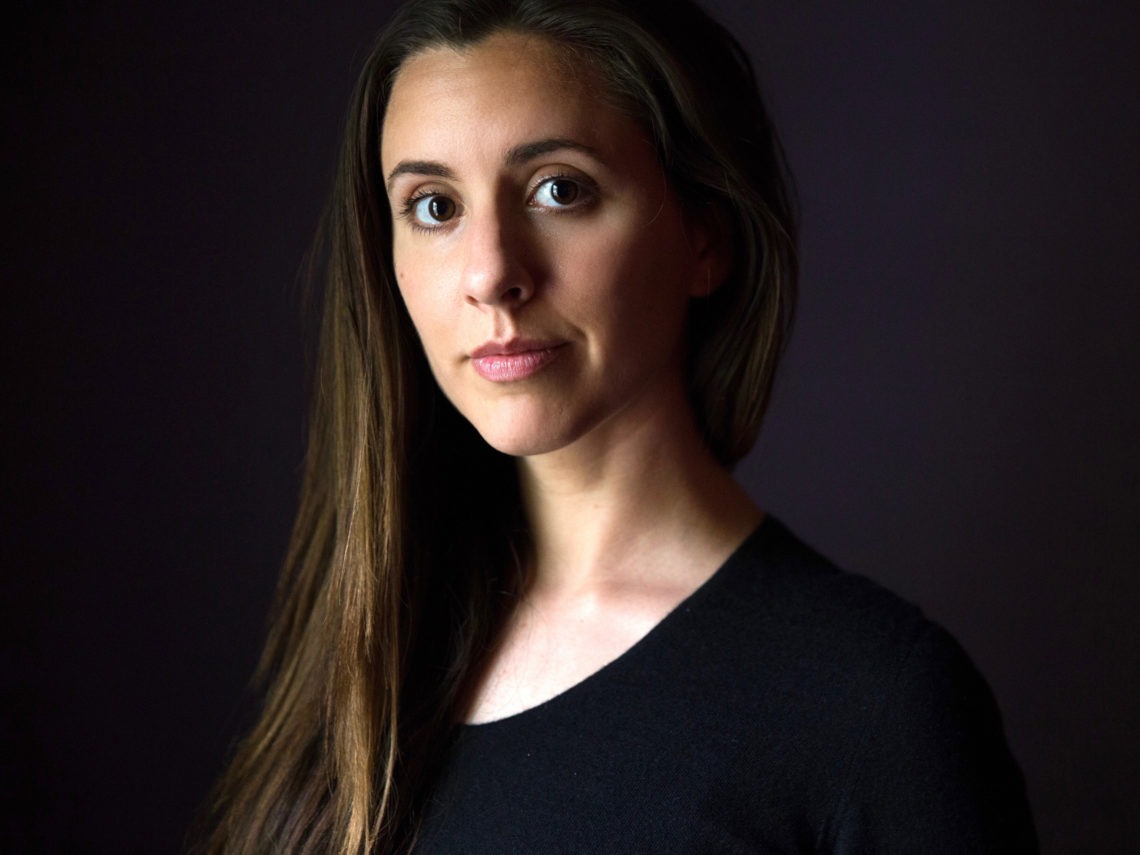
Eva Rendle (‘19)
This year’s Student Academy Awards honored May graduate Eva Rendle with a bronze medal, one of three winners in the best documentary short category. This year’s Oscar win caps a five-year run of medals for Berkeley student filmmakers.
Brett Simpson (’21) was named winner of the National Press Club’s $5,000 Shirley & Dennis Feldman Fellowship. Simpson, a 2016 Princeton graduate, plans to cover the nexus of health and environment.
Max Brimelow and Meiying Wu (both ’20) were awarded scholarships from the National Academy of Television Arts & Sciences SF/NorCal Chapter. Meiying also received a $10,000 Nikon Storytellers Scholarship. Max recently screened, at The David Brower Center in Berkeley, his video series for Berkeleyside on threats to local wildlife.
Rosa Tuirán (‘20) was awarded the Brian Pollack Documentary Fellowship, presented annually to a promising documentary student in honor of the late Brian Pollack, a 2008 graduate.
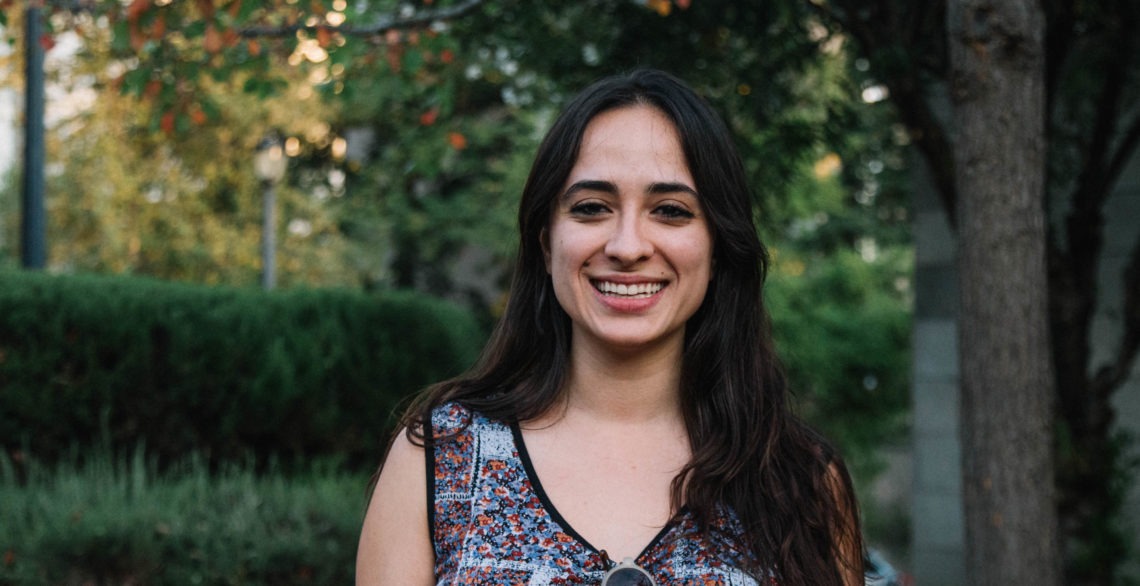
Gisela Pérez de Acha (‘20) Photo: Clara Mokri (‘21)
Gisela Pérez de Acha (‘20), a Mexican human rights lawyer studying multimedia at the School, has been working as an open source investigations researcher for the law school’s Human Rights Center, using social media and satellite images to report on conflict across the world. Gisela also reported on The New York Times visual investigations team’s remarkable “The Siege of Culiacán” documentary for “The Weekly,” and was featured on NPR’s “In the Thick” podcast talking about feminist protests in Mexico City.
Mara Kardas-Nelson’s (’20) meticulously reported story on St. James, La., located in “Cancer Alley,” at the wrong end of Louisiana’s political economy, ran in The Nation.
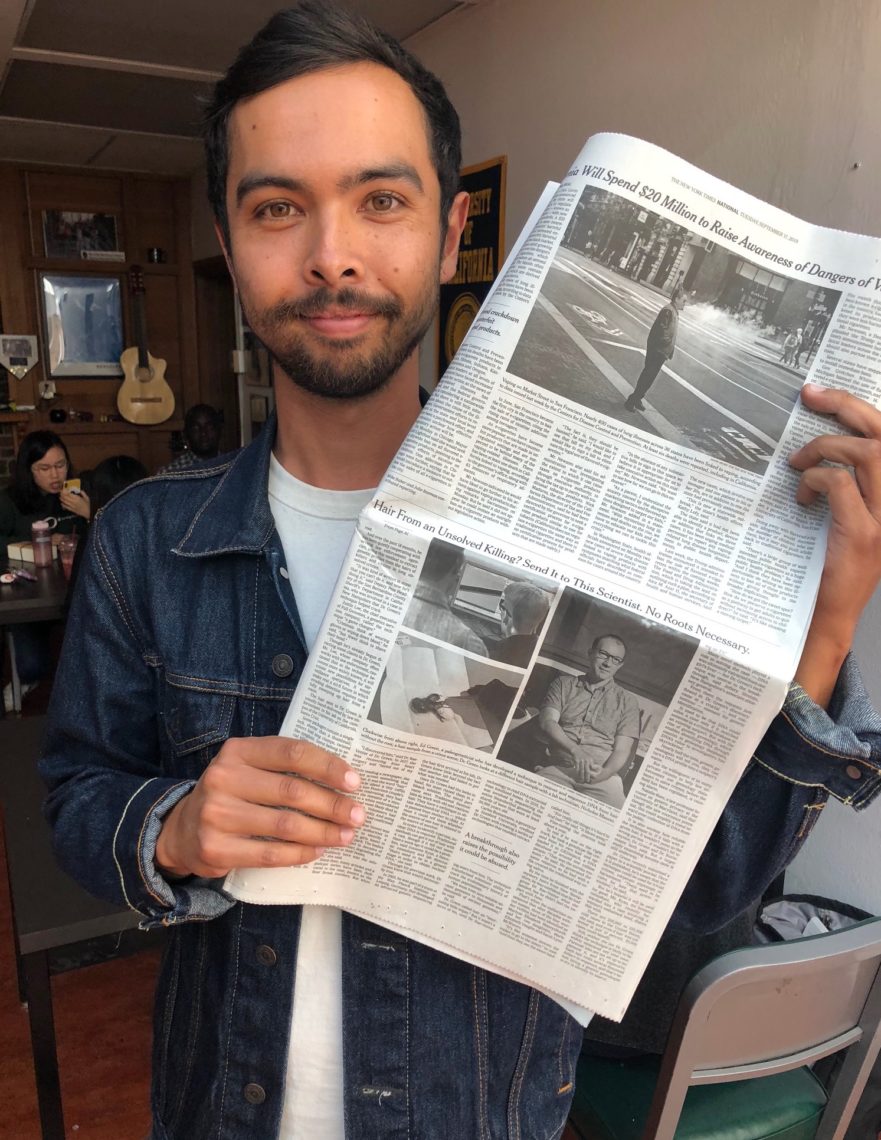
2nd-year shooter James Tensuan’s (’20) photos of Ed Green, a paleogeneticist at UC Santa Cruz whose new technique makes it possible to recover and sequence DNA from hair without the root, ran in The New York Times. James’s picture of a worldwide climate protest also got prominent play in The Times.
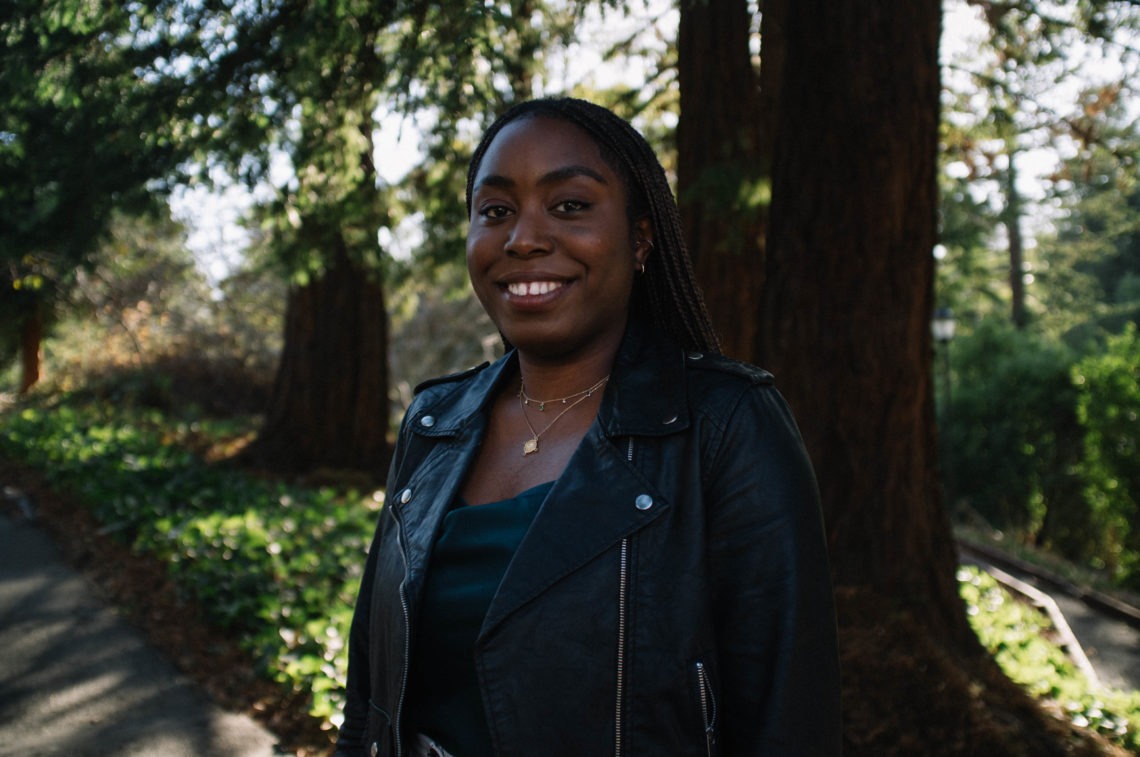
Ashley Omoma (‘20). Photo: Clara Mokri (‘21)
Ashley Omoma (‘20) was named this year’s Marlon T. Riggs Fellow. The $10,000 fellowship was created in 2014 through the efforts of Vivian Kleiman, long-time collaborator of the late alumnus and filmmaker Marlon Riggs (’81), who helped build the School’s documentary program.
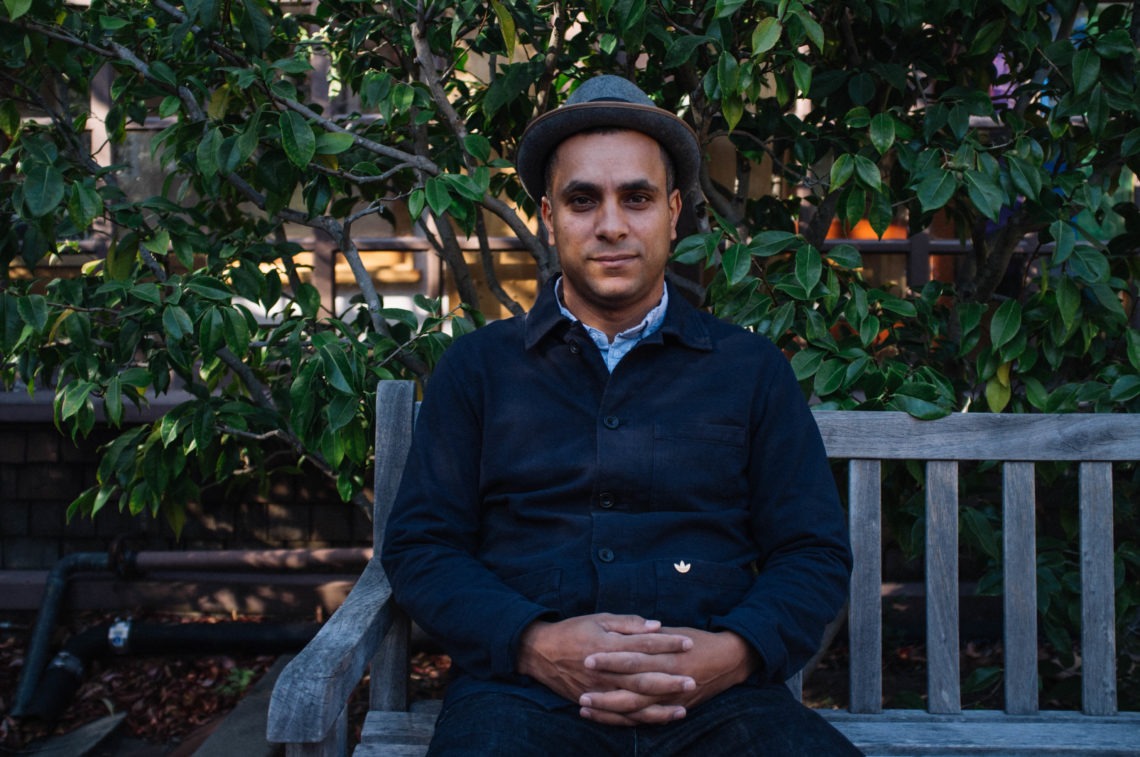
Photo: Clara Mokri (’21)
Multimedia artist Wesaam Al-Badry (‘20), whose work marries fine art with journalistic narratives, has had a string of successes. His photographs appeared in a recent exhibition at Frankfurt’s Museum Angewandte Kunst, with some 70,000 visitors; he was selected for the prestigious Eddie Adams Workshop and nominated to be a TED Fellow in Canada; and his photos will appear at the Cooper Hewitt, Smithsonian Design Museum in New York from February-August 2020.
Sarah Trent‘s (’20) report on post-Soviet co-ops in rural Mongolia appeared in YES! Magazine, and her “Burning Out,” on the effects of climate change on search and rescue teams, ran in Longreads. Sarah and Brian Perlman (‘20) spent a week in Brussels with journalism students from seven universities in the lead-up to historic European Council meetings on Brexit, European Union expansion, and Europe’s response to Turkey.
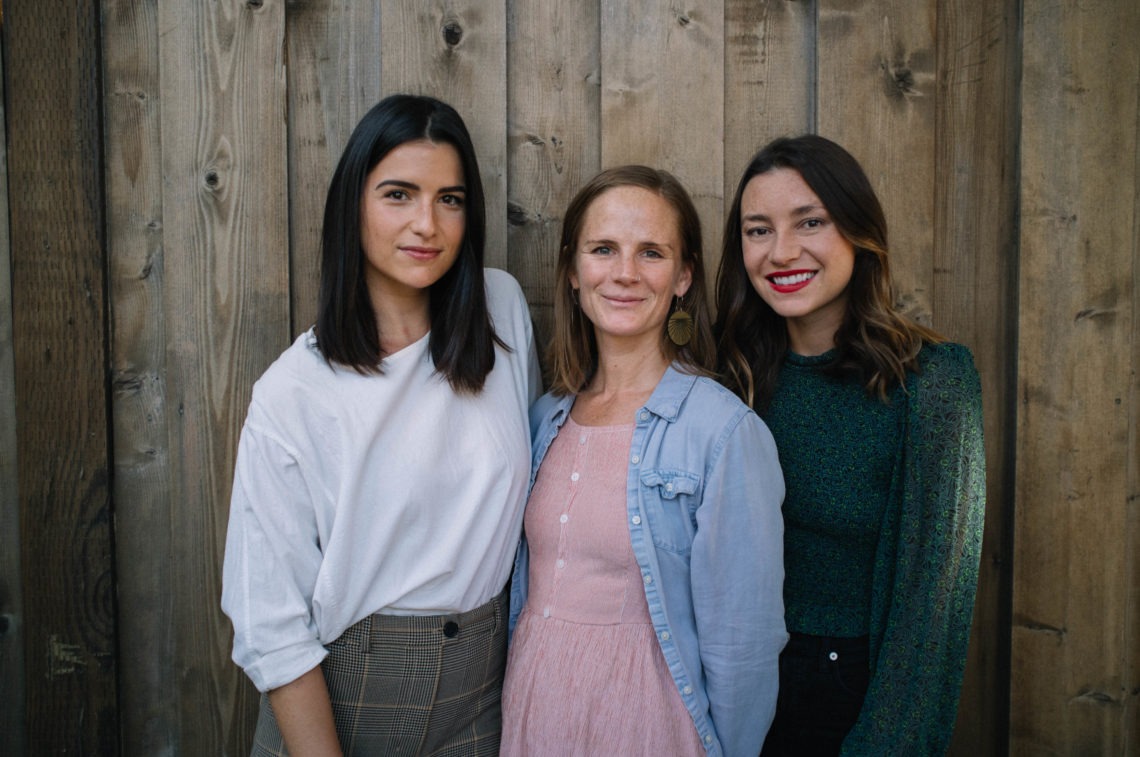
From left, Laurence Du Sault, Mara Kardas-Nelson and Molly Forster (all ‘20). Photo: Clara Mokri (‘21)
Three second-year students were awarded the inaugural climate reporting fellowships from the newly launched UC Berkeley National Institute for Climate Education: Mara Kardas-Nelson, Molly Forster, and Laurence Du Sault. The fellowships of $4,000, plus expenses, are designed to encourage in-depth journalism on the climate crisis. Kardas-Nelson, Forster and Du Sault will pursue stories with scientific input from Atmospheric Sciences Prof. David Romps, and journalistic guidance from Berkeley Journalism lecturer Mark Schapiro.
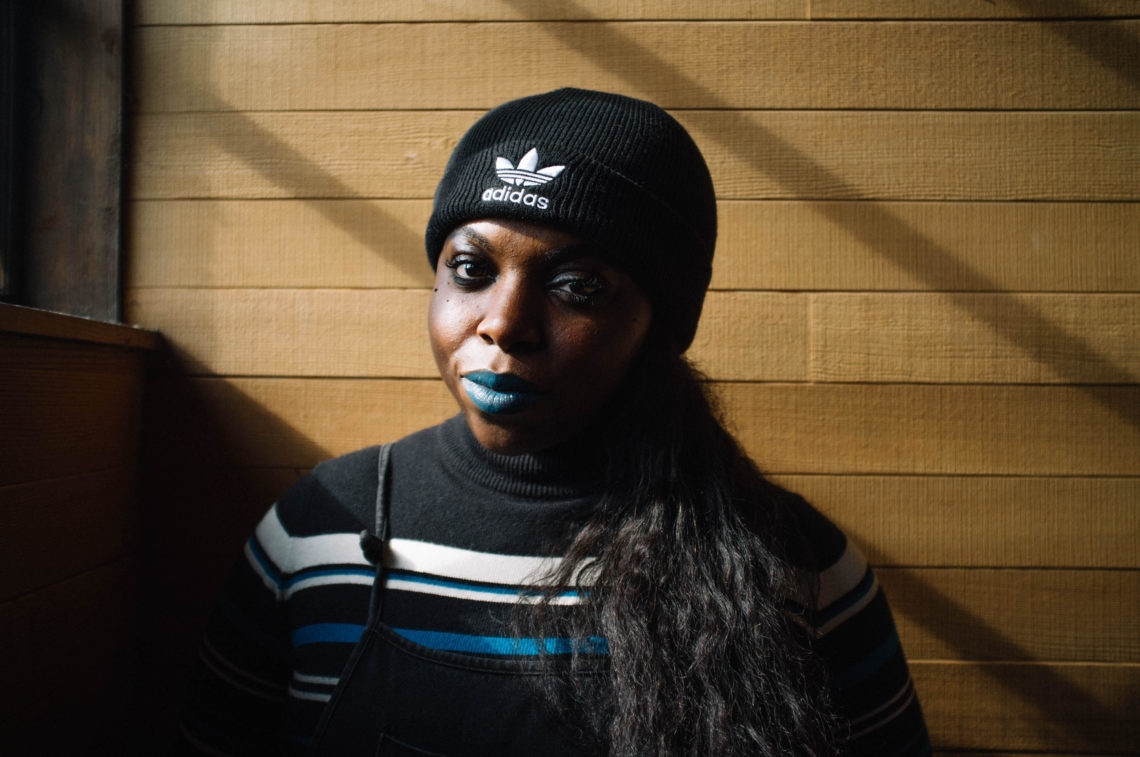
Angelica Ekeke (‘20). Photo: Clara Mokri (‘21)
Angelica Ekeke (‘20) opened the Pulitzer Center’s annual Washington weekend with “The Forgotten Onez” on Nigerian refugees in Bavaria. The project was also featured at a Berkeley Law Human Rights conference in November. Angelica headlined the Reimagine Festival 2019 at the Sydney Goldstein Theater in San Francisco—displaying her visual symphony work that fuses reporting, film, and live music—alongside author Anne Lamott and podcast journalist Anna Sale. And Angelica was November’s featured artist in the San Francisco Chronicle’s new column “Creative Lives,” focused on creatives who are thriving in the Bay Area.
Alex Nieves and Anne Wernikoff (both ’19), were winners of SPJ Northern California’s top student reporting award for their thesis “Second Class,” a multimedia project exploring the lives of California’s more than 2 million undocumented workers.
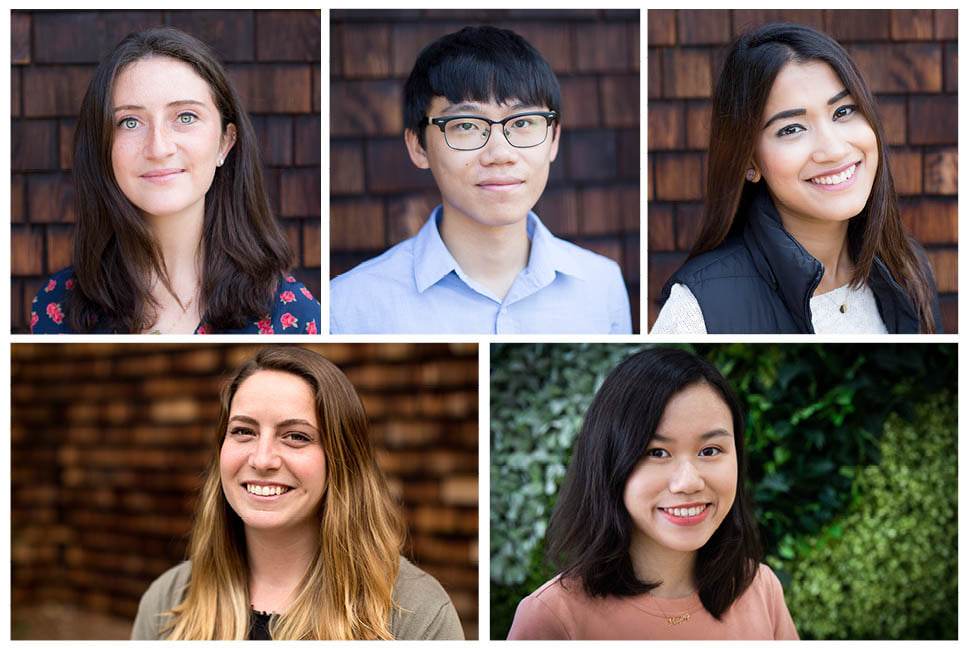
Clockwise from top left: Susie Nelson, Yutao “Todd” Chen, Javaria Khan, Meiying Wu, and Francesca Fenzi.
Four alums and one current student were recognized in the 74th College Photographer of the Year (CPOY) Awards. They competed against 534 student photographers from 112 colleges and universities in 19 countries. Yutao Chen and Francesca Fenzi (both ‘19) won bronze for “Dirty Business;” Yutao Chen and Javaria Khan (both ‘19) received an Award of Excellence for “Toxic Land;” Yutao Chen, Francesca Fenzi and Susie Neilson (all ‘19) won silver for “Dirty Business;” and Meiying Wu (‘20), received an Award of Excellence for “Sign for Identity.”
Five ’19 graduates were finalists for the Online News Association’s David Teeuwen Student Journalism Award: Francesca Fenzi, Yutao “Todd” Chen, Susie Neilson, Anne Wernikoff, and Simon Campbell. Yutao and Francesca took the top prize for small newsrooms with “Dirty Business,” a multimedia project on recyclers in Vietnam wrestling with the consequences of an empire built on U.S. trash.
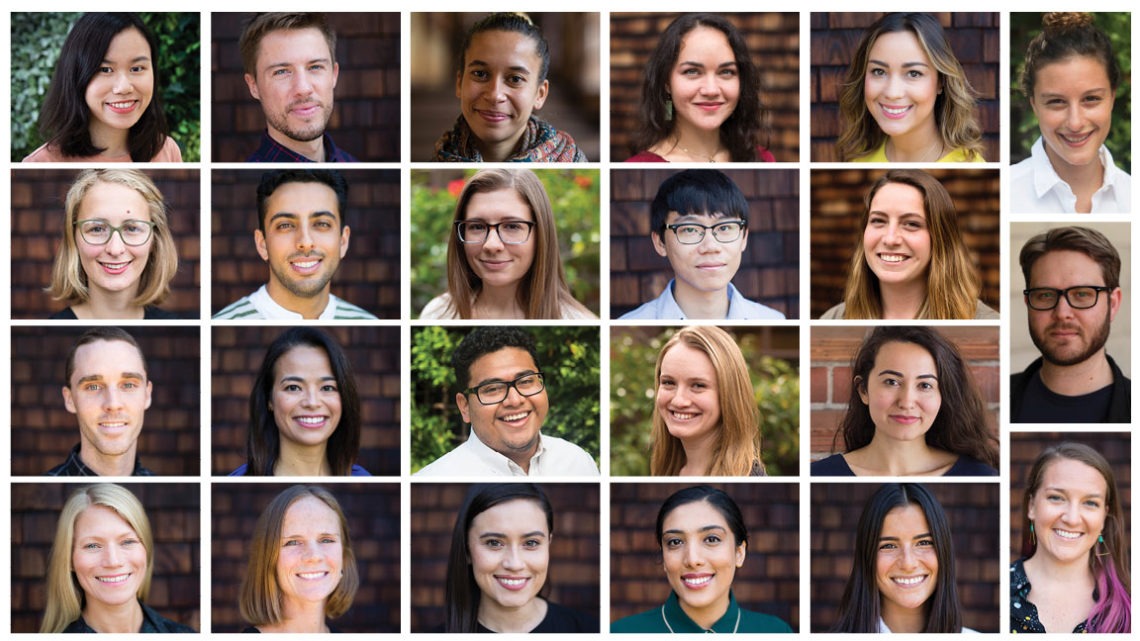
Excellence Award winners, from left, top row: Meiying Wu (‘20), Walker Dawson (‘19), Caron Creighton (‘19), Lorin Eleni Gill (‘19), Karla Caraballo-Torres (‘19), Sara Harrison (‘19); Second row: Nina Sparling (’20), Brandon Yadegari (‘20), Kaitlin Benz (‘19), Yutao Chen (‘19), Francesca Fenzi (‘19), Lucas Guilkey (‘19); Third Row: Wyatt Kroopf (‘20), Alyson Stamos (‘20), Luis Hernandez (‘19), Leah Rosenbaum (‘19), Sarah Cahlan (‘19); Bottom Row: Lisa Hornak (‘19), Mara Kardas-Nelson (‘20), Betty Márquez Rosales (‘20), Ravleen Kaur (‘20), Laurence Du Sault (‘20), Sarah Trent (‘20).
In addition to the recognition our students get from outside entities every year, we convene our own teachers and alumni to honor work that exemplifies what the School itself most values. These are the Excellence Awards, which recognize student journalism that combines professional quality with public importance. Please join us in congratulating the makers of this exceptional work.
In faculty news, Prof. Mark Danner, who received a Guggenheim Fellowship for a book on the late New York Review of Books co-founder Robert Silvers, is delivering the Robert B. Silvers Memorial Lecture at the New York Public Library in December.
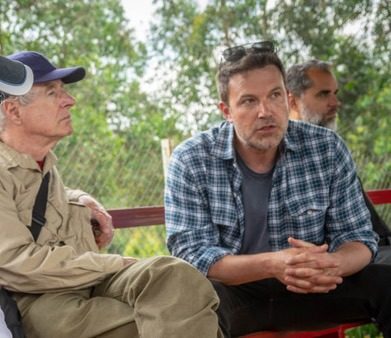
Adam Hochschild and Ben Affleck on a recent trip near Bukavu.
Lecturer Adam Hochschild recently wrote an article for The Nation about parallels between today’s hysteria against the press and immigrants and the United States of 1917. And it looks like one of Adam’s most celebrated books may become a movie. Oscar-winning actor and producer Ben Affleck has an option on the film rights for his book, King Leopold’s Ghost, about Belgium’s 19th Century genocide in the Congo. The two joined activists on a recent trip to visit Congolese development projects that Affleck has supported over the last decade. After they returned, they co-authored an op-ed for The Los Angeles Times.
Continuing Lecturer Ben Manilla, a mainstay of our audio journalism program since 2004, is retiring after this semester. Manilla stepped up to lead the program from 2014 to 2017, and under his professionalism and mentorship the program has established a strong reputation for excellence. He’ll be greatly missed.
Prof. Geeta Anand published an opinion piece for The New York Times, “How Not to Grow Old in America,” about the problems with assisted living. For weeks, it was among the most emailed articles in The Times.
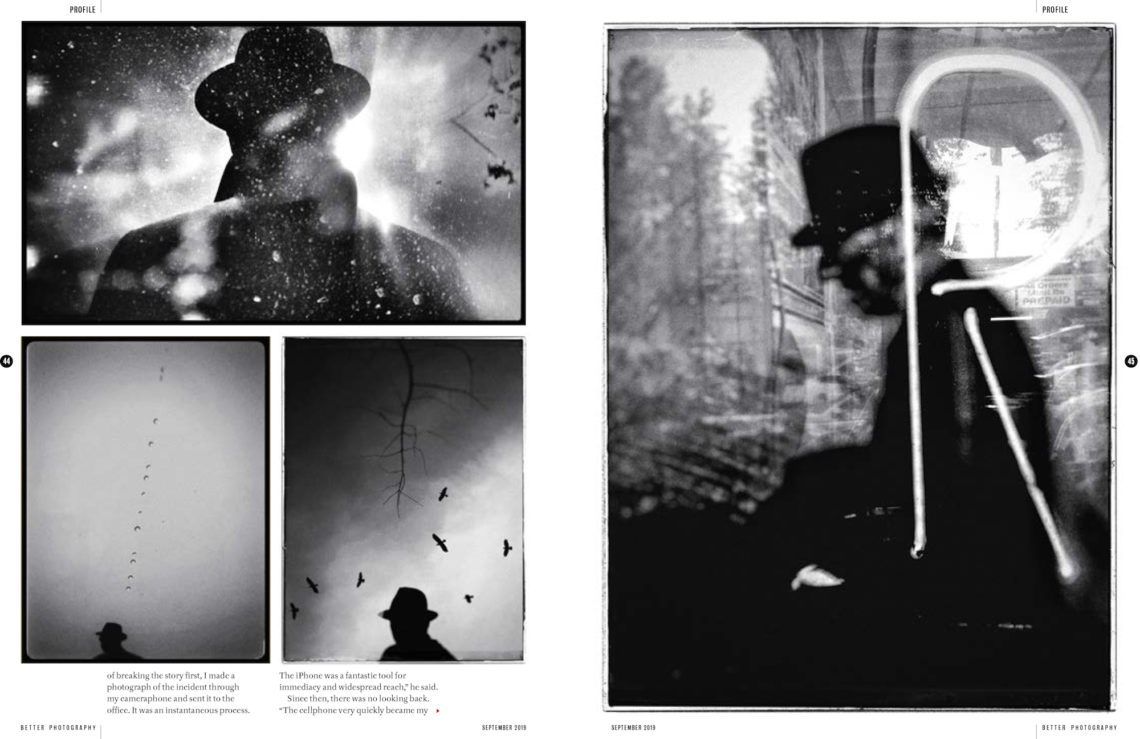
Associate Professor and Bloomberg Chair Richard Koci Hernandez’s pictures ran in the September issue of Better Photography Magazine. You can join this internationally recognized innovator in journalism and multimedia’s nearly 270,000 followers on Instagram @koci.
In the spring, lecturer Mark Schapiro reported from the Central Valley of California on the collision between commercial agriculture and climate change. His stories came out recently in a joint production with Bay Nature magazine and KQED News.
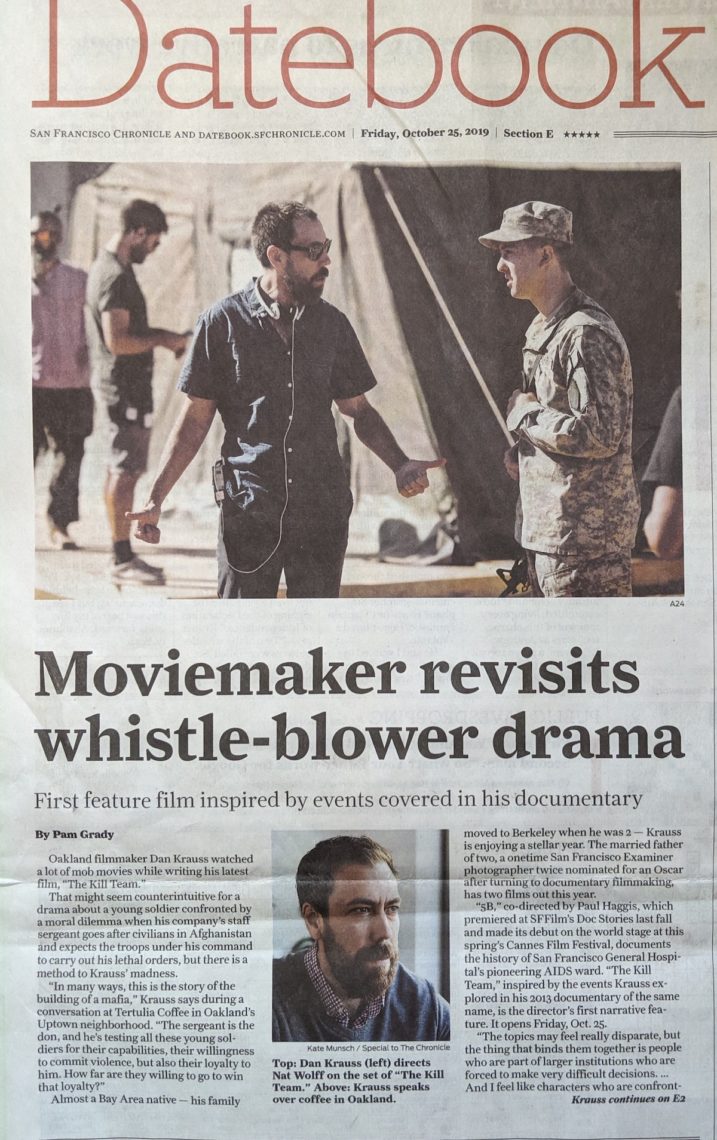
Six years after alum/writer/director Dan Krauss’ (‘04) film “The Kill Team” won Best Documentary at the Tribeca Film Festival, he has directed a narrative adaptation of the same events, which had its theatrical release in October, starring Alexander Skarsgard. Don’t miss it.
Lecturer Samantha Grant (‘07) was a producer on the Emmy-nominated Survivors, about Sierra Leonean healthcare workers heroically facing the Ebola epidemic in their country, for POV on PBS.
Lecturer Peter Aldhous was a finalist in the Communication Awards, organized by the National Academies of Sciences, Engineering, and Medicine, for “Wildfires: What Drives Them, and What is My Risk?,” a series of data-driven stories for BuzzFeed News.
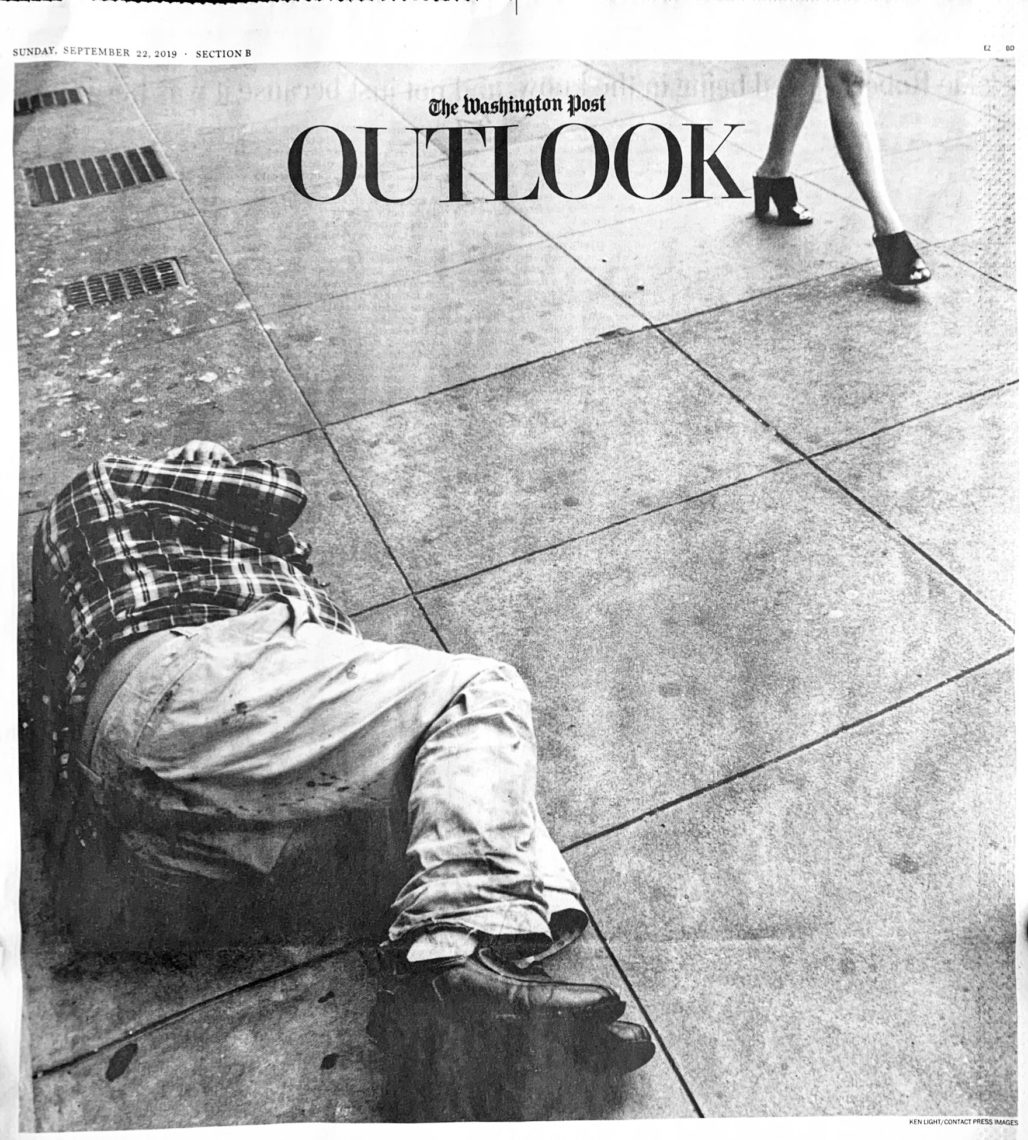
Homeless man, San Francisco (Ken Light//Contact Press Images), Washington Post, Sept. 18, 2019
Adjunct Prof. Ken Light has a new one-person photography show, American Pictures, at UC Berkeley’s Townsend Center for the Humanities that runs through summer 2020. His new book, “Midnight La Frontera,” will have an April release. He is also collaborating with Prof. Andrés Cediel on a documentary based on photographs taken between 1983-1987 when he traveled with the Border Patrol in California and Texas. Ken has also just finished working with Ten Speed Press/Random House on “Picturing Resistance,” with text by his wife Melanie Light, featuring work by over 75 photographers from 1954-2019.
Netflix is airing an eight-part series called “Unbelievable” based on Berkeley Journalism lecturer T. Christian Miller’s Pulitzer Prize-winning reporting at ProPublica. An astounding 32 million people viewed it in the first 28 days after its release.
Jennifer Kahn (‘00) spoke at the Commonwealth Club in August, updating attendees on quickly evolving gene editing and gene drive technologies and their implications for society, extending from their use in areas such as human fertility, agriculture and pharmaceuticals.
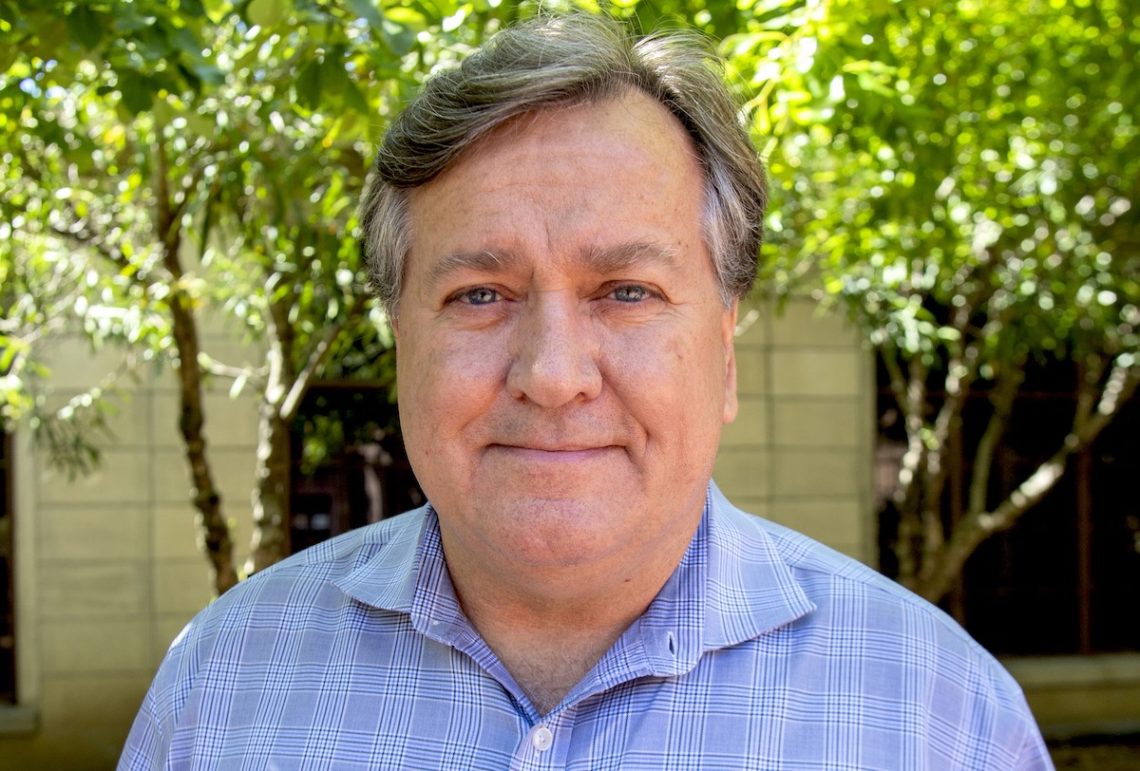
Prof. David Barstow. Photo: Wesaam Al-Badry (’20)
In August, the IRP welcomed its new leader, David Barstow, a longtime senior writer at The New York Times, who succeeds retiring Prof. Lowell Bergman. David opened his weekly class on investigative reporting this semester to all interested students, and wound up with nearly 40. Working closely with him is Prof. Geeta Anand as IRP interim director, Janice Hui in a new role as managing director; and Mila MacBain as operations director.
David intends to increase the flow of powerful investigative stories pursued at the IRP and to draw as many students into creating those stories as possible. To that end, the IRP has hired 32 students as paid researchers. Some are working closely with an IRP reporter or producer, while others meet weekly to work collaboratively on a high-impact investigation under the supervision of Geeta.
The IRP also welcomed three documentarists as fellows: Jameka Autry, Lucas Guilkey (’19) and Rachel Witte (’14). The three filmmakers will be working on investigative projects through next summer. Read more about them here.
Meanwhile, a six-month investigation involving more than 30 newsrooms across California, initiated by the IRP under Lowell and former director John Temple, has found hundreds of criminal convictions against current and former police officers. Joining the series’ main reporter, the IRP’s Robert Lewis (’08), and a dozen Berkeley alums and students including Katey Rusch, Laurence Du Sault and Ali DeFazio [all ’20] have been California-based reporters from McClatchy, the USA Today Network, and the MediaNews Group.
A related story, Nikka Singh’s (’19) thesis project on a police officer employed despite repeated allegations of serious misconduct, aired on “Reveal” from The Center for Investigative Reporting nationwide.
IRP reporter Garrett Therolf recently published two stories in the Los Angeles Times about the tragic deaths of two children in Southern California. His investigation of the death of a 10-year-old appeared on the front page in September. Over the summer, Garett co-wrote a story with Alyson Stamos (’20) about the suspicious death of another young boy allowed to remain with his parents despite a court order.
Attorney and continuing Lecturer Thomas R. Burke represented freelance journalist Bryan Carmody, who early one morning in May woke to the sound of 10 San Francisco police officers breaking into his home. Carmody was handcuffed for six hours and SF Police seized all of his computers and phones from his home while FBI agents questioned him about who leaked to him a police report about the controversial death of San Francisco’s Public Defender. Thanks to Tom’s intervention, all five San Francisco judges who originally granted the search warrants voided them, ensuring that information police obtained using the orders could not be used.
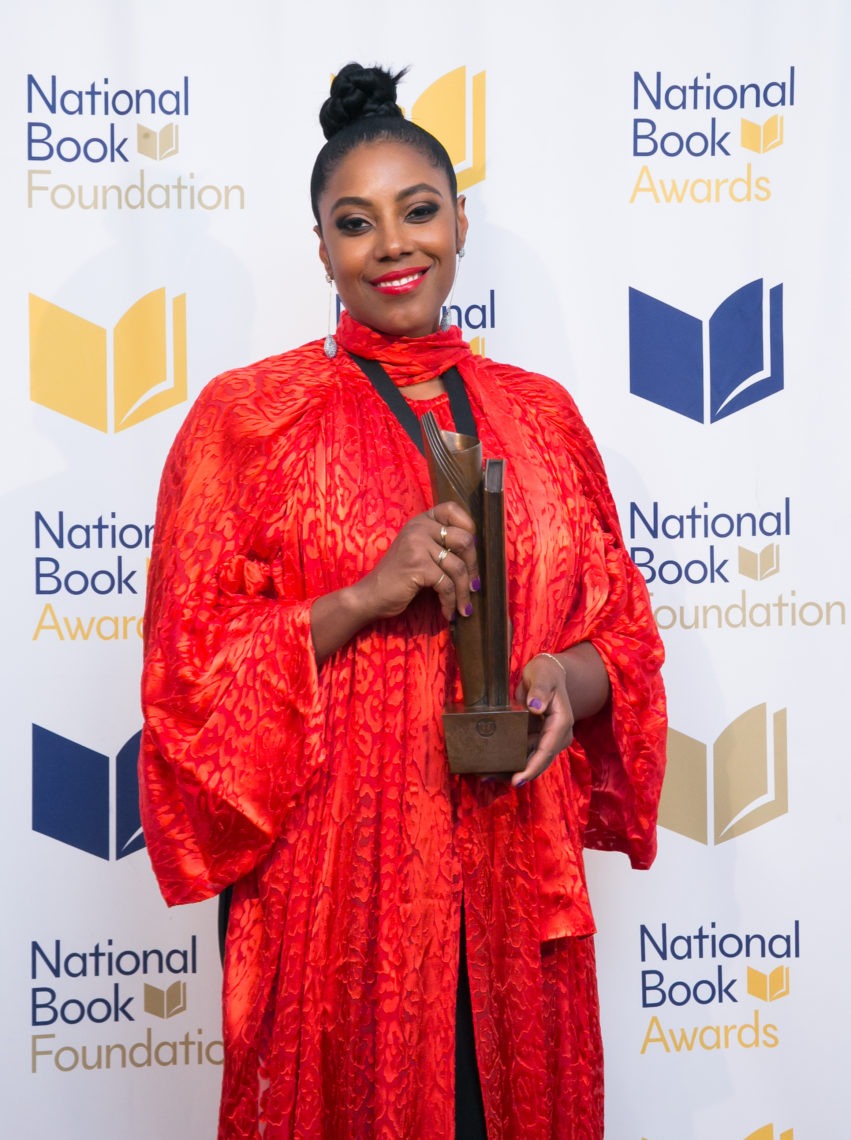
Sarah M. Broom (’04). Photo: Beowulf Sheehan
Sarah M. Broom’s (’04) The Yellow House won the 2019 National Book Award for Nonfiction. This remarkable debut book tells the story of a hundred years of Sarah’s family and their relationship to home in a neglected area of one of America’s most mythologized cities, New Orleans.
Three (’19) director/producers have been nominated for the International Documentary Association’s prestigious David L. Wolper Student Documentary Award: Nominees are Emma Schwartz, JoeBill Muñoz, Eva Rendle. The instructors they worked with include: Carrie Lozano (‘05), Dawn Porter, Mike Shen and Chris O’Dea.
John Battelle (‘92), a Berkeley Journalism Advisory Board member, has launched a new politics site, The Recount. Check it out.
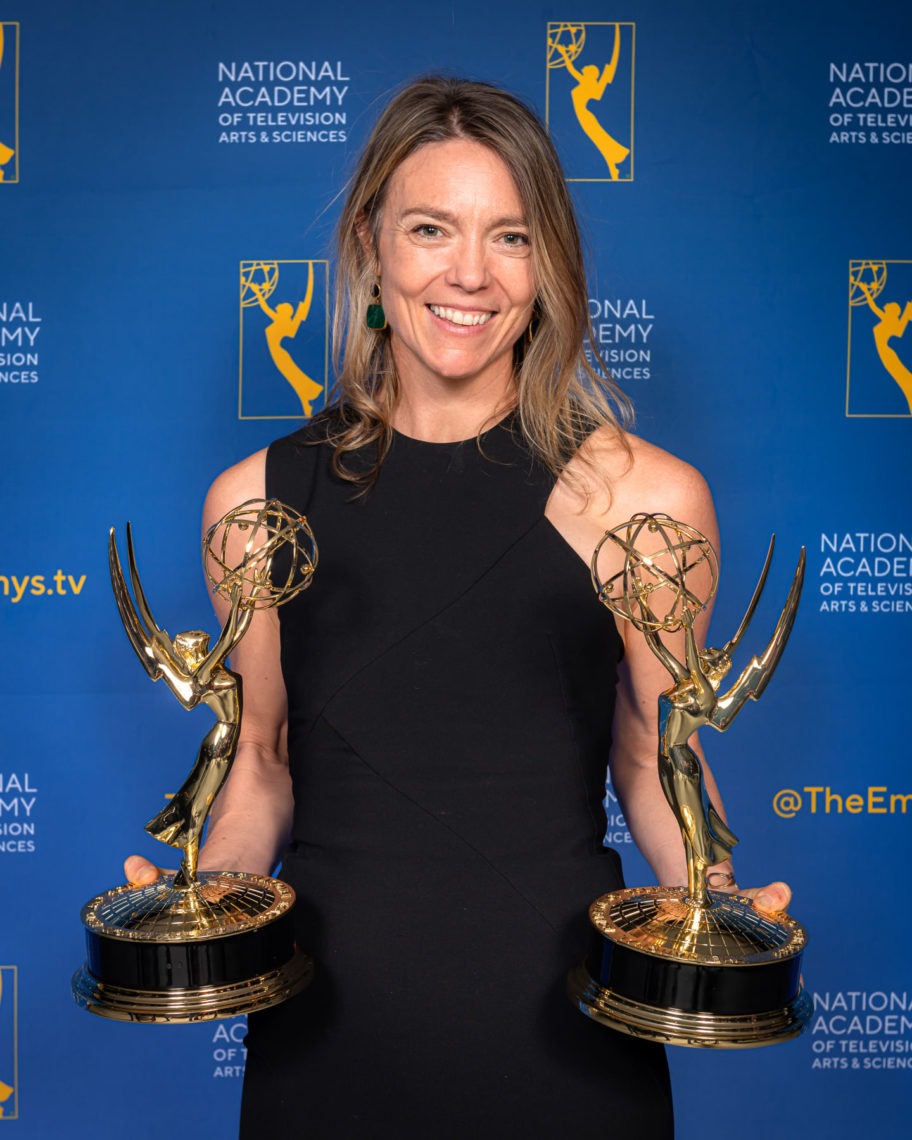
Producer and cinematographer Singeli Agnew (’07) took home two (!) Emmys: Outstanding Investigative Report in a Newsmagazine for “Adoption Inc.” for Fault Lines, and Outstanding Video Journalism/News for her camerawork in “The Killing Rooms of Mosul” for VICE News.
Grace Oyenubi and Nani Walker (’18) talked to the PBS NewsHour about their extraordinary thesis documentary “Forced,” on the Boko Haram violence in Nigeria.
Vincent DiGirolamo‘s (’78) intriguing new book “Crying the News: A History of America’s Newsboys” –about publishers using children, propagated as symbols of the American dream, to help build the newspaper industry–is out now.
Producer Jeffrey Plunkett (’05) won the 2019 Emmy Award for Outstanding Science and Technology Documentary for “Science Fair” on National Geographic. The film, which follows nine high school students as they navigate rivalries, setbacks and hormones on their journey to compete at The International Science and Engineering Fair, also took home top audience awards at the Sundance Film Festival and SXSW.
Cassandra Herrman (’01) and Nani Sahra Walker (’18) won an Online News Association award for “What They Carried,” an intimate augmented reality experience on the confiscated personal belongings of migrants apprehended crossing the US/Mexico border, from McClatchy’s New Ventures Lab.
Drew Costley (‘19) won a National Association of Black Journalists Salute to Excellence Award for best student photography. Producer Shaleece Haas’ (‘10) documentary short “Texas Strong”—an intimate portrait of a mother rejecting her community’s beliefs to defend her seven-year-old transgender daughter—won a News & Documentary Emmy for Outstanding Short Documentary.
Filmmaker and Advisory Board member Carrie Lozano (‘05) was named to The Academy of Motion Picture Arts and Sciences. Carrie was both an undergraduate film major at Cal and a journalism graduate. She was also a post-graduate fellow at the IRP from 2008–2009, and will be teaching history of documentary in the coming term.
“Inside Bill’s Brain: Decoding Bill Gates”—a 3-part series on the iconic tech billionaire co-executive produced and written by alum Steven Leckart (’07), premiered on Netflix in October.
Producers/directors Eleni Gill and Karla Caraballo-Torres (’19) premiered their thesis documentary “School Crossing”— on the humanitarian crisis in Venezuela and its impact on education of the country’s children— at the Immigration Film Festival in Washington, D.C.
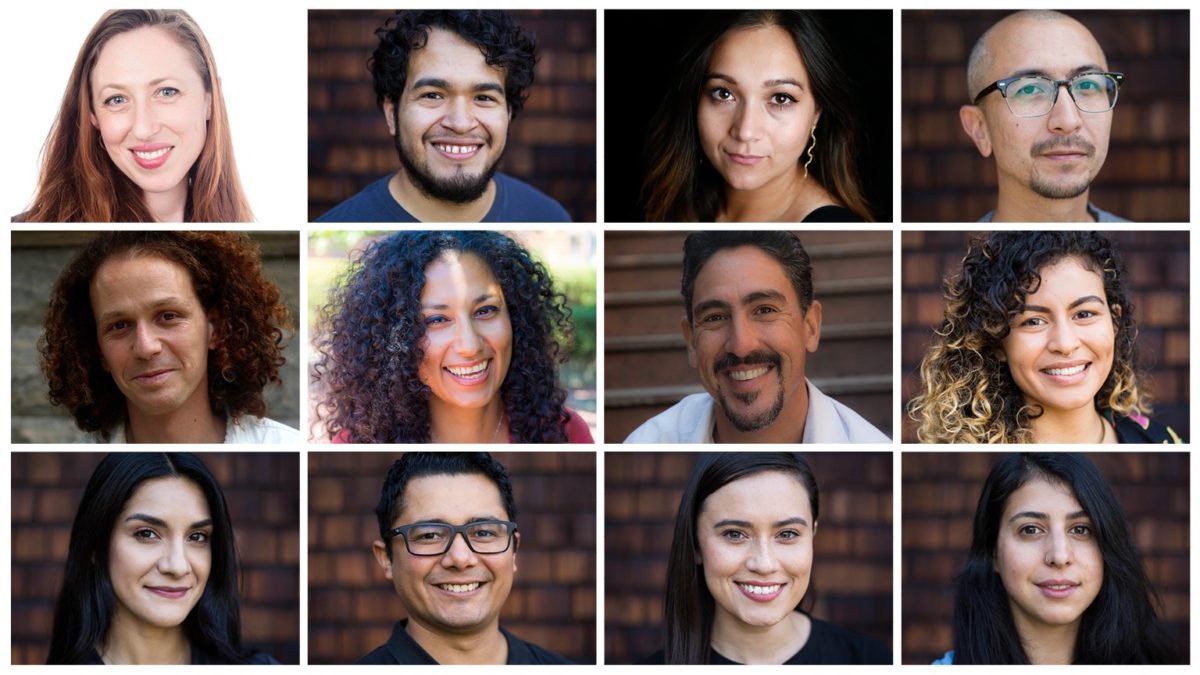
From top row left: Garance Burke (’04), JoeBill Muñoz (’19), Bo Kovitz (’19), Jean-Philippe Dobrin (’19) Middle Row: Mario Furloni (’11), Daffodil Altan (’04), Andrés Cediel (’04), Jess Alvarenga (’20) Bottom Row: Lulu Orozco (’20), Pedro Cota (’20), Betty Márquez Rosales (’20), Rosa Tuirán (’20).
A FRONTLINE and Associated Press investigation on the mass confinement of migrant children, produced by FRONTLINE’s Daffodil Altan (’04) and Berkeley Journalism Prof. Andrés Cediel (’04), featuring AP investigative reporter Garance Burke (’04), aired on PBS stations nationwide in November.
The film’s production benefitted from the involvement of many recent and current Berkeley Journalism students including JoeBill Muñoz, Jean-Philippe Dobrin and Bo Kovitz (all Class of ’19) who worked as associate producers, Mario Furloni (’11) as additional camera, current students Pedro Cota and Jess Alvarenga as production assistants, and Lulu Orozco, Rosa Tuirán and Betty Márquez Rosales (all Class of ’20) assisting with translations. Watch the trailer here.
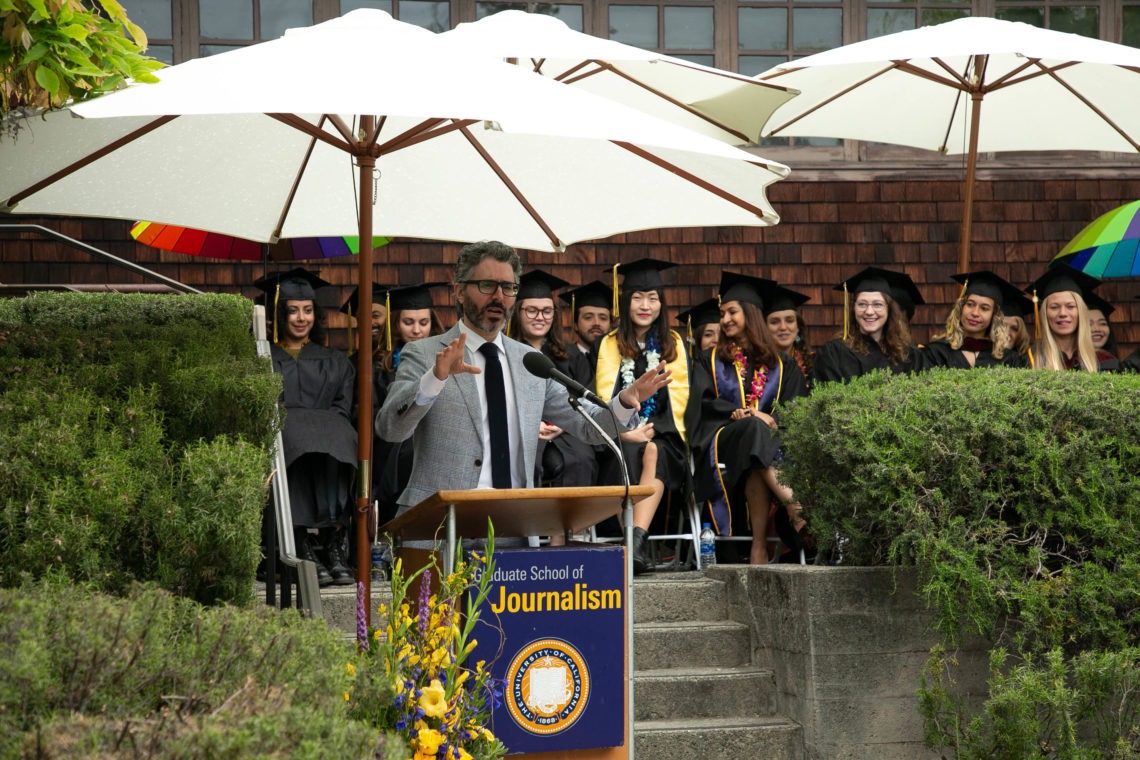
Michael Barbaro by Jess Alvarenga (’20)
Among other events, watch our Class of 2019 Commencement speaker Michael Barbaro, whose New York Times podcast “The Daily” recently hit the one billion downloads mark—send the class out in form during the first rainy commencement we’ve had in 30 years.
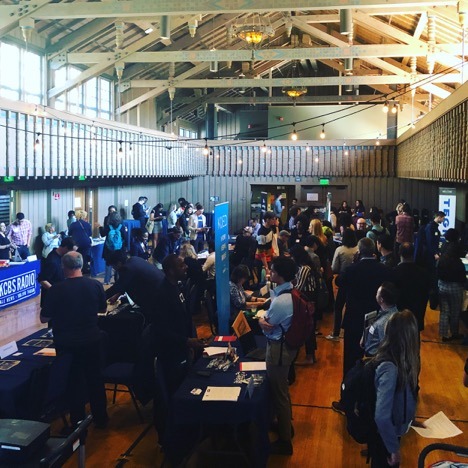
Media Career Fair at Anna Head Alumnae Hall.
In November our National Association of Black Journalists (NABJ) chapter—led by Bo Tefu and Carla Williams (both ‘20)— hosted the School’s inaugural Media Career Fair at Anna Head Alumnae Hall, bringing recruiters from top media companies including The New York Times, Wall Street Journal, KQED, CNN, CalMatters, Reveal, The San Francisco Chronicle, Tegna and the Santa Rosa Press Democrat, to discover fresh talent in the Bay Area.
The turnout of career-minded students and top-tier employers was exceptional, and the hall was abuzz with an electricity and optimism that used to be typical of journalism gatherings. It suggests a buoyancy that we hope is returning to the news world.
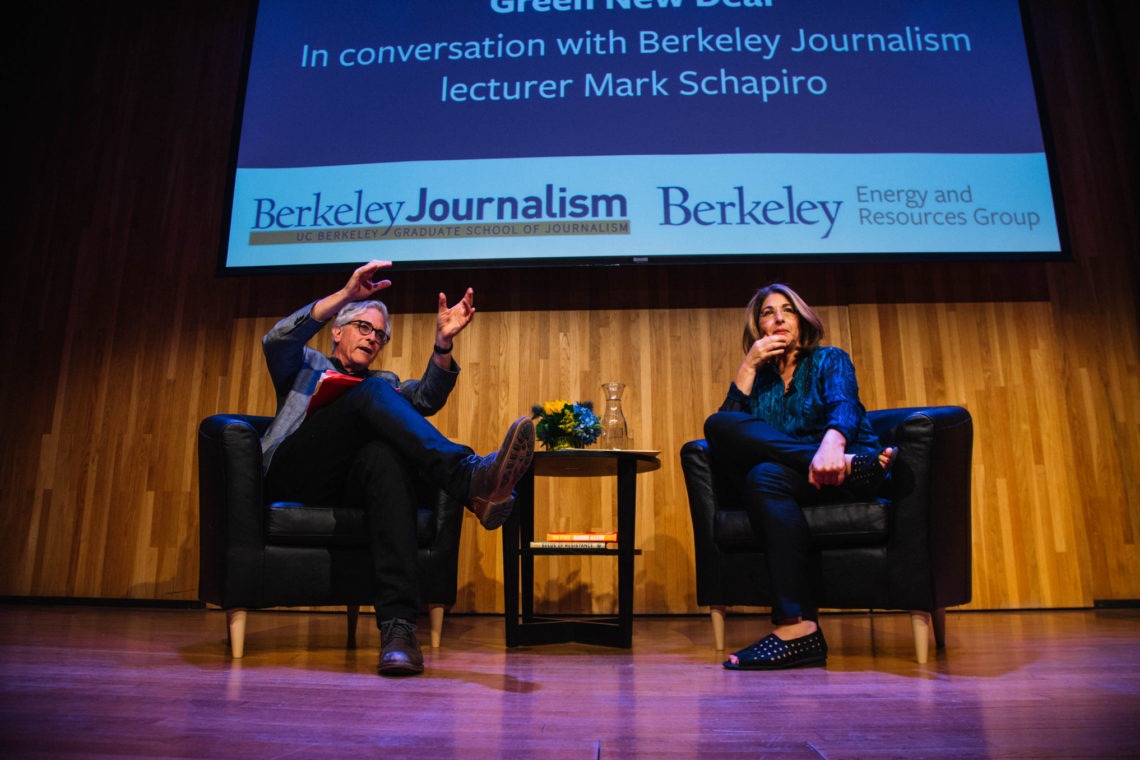
Mark Schapiro and Naomi Klein. Photo: Clara Mokri (‘21)
In October before a packed house, best-selling author Naomi Klein discussed her new book, ON FIRE: The (Burning) Case for a Green New Deal, which argues for a transformation of our economy and politics as climate disruptions accelerate. She was joined in discussion with lecturer Mark Schapiro, author of Seeds Of Resistance: The Fight to Save Our Food Supply, an investigation into the battle to control the seeds capable of responding to climate disruptions. Watch the video here.
Other recent events of note include “The Crisis in News Media: Why it matters and what should be done,” with Financial Times CEO John Ridding; our 2nd Annual Chris Boskin Lecture Series—thanks to a gift from Cal alum Michael Boskin— co-hosted with the Haas School of Business featuring a line-up of big names in sports: Jeanie Buss, Dave Kaval, Steve Kerr, Ronnie Lott and moderated by Chris Ballard, senior writer at Sports Illustrated and Berkeley Journalism lecturer; in October, White House correspondent Maggie Haberman of The New York Times hosted our students backstage for an hour-long private talk at Zellerbach Hall; and Ross Andersen, deputy editor of The Atlantic, gave a “Think Like an Editor” talk as part of the 11th Hour Project’s Food & Farming Journalism Fellowships, funded by alum Wendy Schmidt (’81), run by alum and New York Times Magazine contributor Malia Wollan (’08).
Meanwhile, our summer journalism program enjoyed record enrollment of 250 students in 2019, with students coming from as far away as Peru, China, France, the Netherlands and Brazil. The journalism minor also drew widely from campus, with students majoring in microbiology, anthropology, math, political science, media studies, cognitive sciences and more studying with us. Once again, our most popular course was Prof. Koci Hernandez‘s class, Journalism & Social Media, which enrolled 97 students. Runner up was Thomas Peele‘s Introduction to Investigative Reporting, with 75.
The Berkeley Advanced Media Institute is offering a new workshop on open source investigations for professionals, scheduled for Jan. 6-10. The training is the first of its kind, and is focused on the effective use of social media in international criminal and human rights investigations using the processes established in the new International Protocol on Open Source Investigations. Register here.
Save the dates: The 3rd Annual Esther Wojcicki (‘64) Lecture, featuring Carole Cadwalladr of The Guardian (UK), the reporter who broke open the Cambridge Analytica story, will be held Feb. 27 with Carole onstage with Prof. Mark Danner; the 14th Annual Reva and David Logan Symposium on Investigative Reporting will be held April 25-26, alumni reunion will be May 2, and commencement will be May 16.
In closing, it’s the time of year when we hope that you’ll consider a tax-deductible contribution to our annual campaign, in an amount large or small, to support training the next generation of journalists, and in the long-view, the vital contribution that Berkeley graduates are making to this indispensable profession.
The need for probing, intelligent, accurate and ethical journalism has never been greater, and as we have done over the past 50 years, Berkeley is forging the future leaders of the journalism that a functioning democracy demands. Reward a treasured public institution for all the excellence you just read about.

About this communique: News from the Desk of Edward Wasserman is a quarterly email newsletter sent to alumni, donors, students, faculty, media partners and others in Berkeley Journalism’s broad community. If you’d like to follow ongoing developments in real-time, find us on Facebook, Twitter and Instagram. Have alumni news or accomplishments to share? Please send it, along with a high-res headshot to Marlena Telvick at journalism@berkeley.edu. Are you hiring? Please reach out to career.services@berkeley.edu.
